Kitchen towels - the face of the hostess
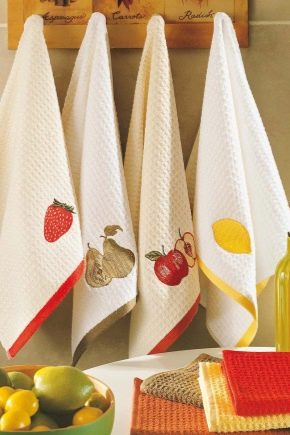
Almost no kitchen work is possible without the use of towels. The fabric is used for drying dishes, drying hands, sanding the hob, or even processing vegetables. In addition, correctly selected towels allow you to add completeness to the kitchen and not only help in the household, but also delight in appearance.
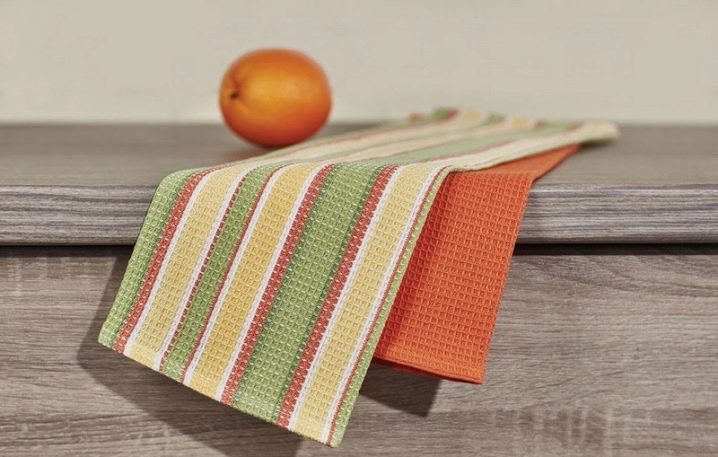
Equipment
A kitchen towel set can contain from one towel to three or more. One towel is suitable in a situation where the dishes are washed and dried in the dishwasher, which means that it does not require additional drying. In this case, a single napkin is used to wipe cleanly washed hands. Most often, housewives use two products - one for hands, and the other for dishes. However, a set of three or more instances has much more scope for application.
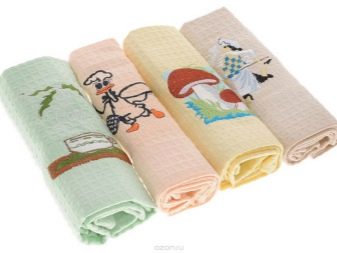
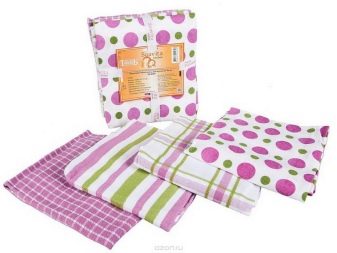
For example, you can select a separate cloth for clean hands and fruits and two napkins for dishes: on the first, wet plates are placed, and on the second, they are wiped off. A microfiber flap will also be useful - with its help it will turn out to bring knives, the surface of a glass-ceramic plate and steel dishes to perfect condition. If there are children in the house, it is better to prepare a separate towel for them. In addition, a "dirty rag" and a wipe after a damp rag will be useful.
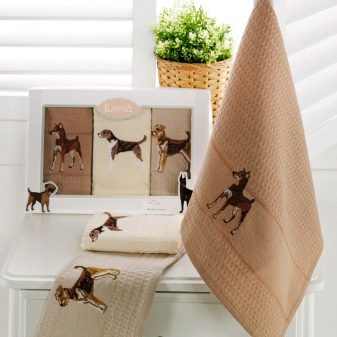
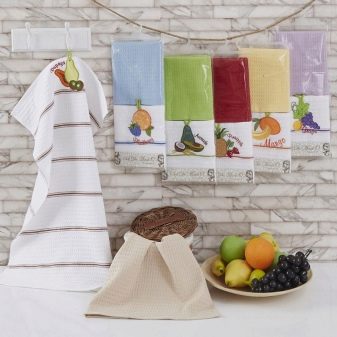
Criterias of choice
The main requirement for kitchen towels is that they are of high quality, that they absorb all the liquid and, ideally, do not leave lint. For many housewives, it is also important that they also fit the interior.
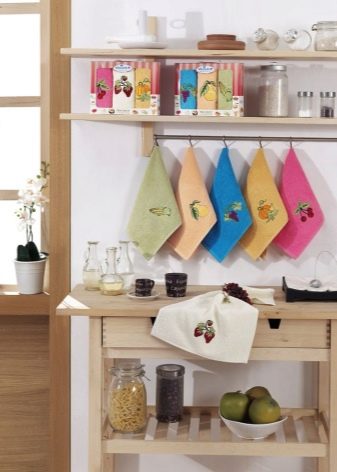
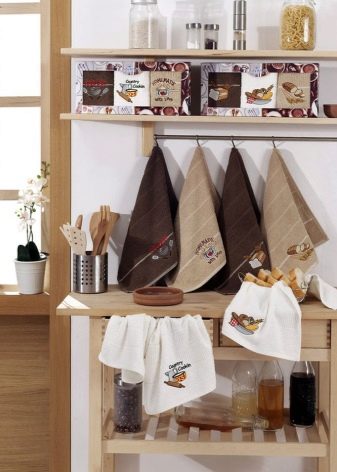
Materials (edit)
As a rule, two types of towels are chosen for the kitchen. The first - terry - are used to wipe your hands. For dishes, napkins based on cotton and linen are suitable. They can also be waffle made from 100% cotton. In the event that easy washable textiles are important, terry towels with a low pile are preferred. Usually they are decorated with inserts from a different material, applique or embroidery. Calico and linen towels always look bright and attractive, and they can also be enriched with lace and edging. Waffle napkins, in turn, have good hygroscopic properties.
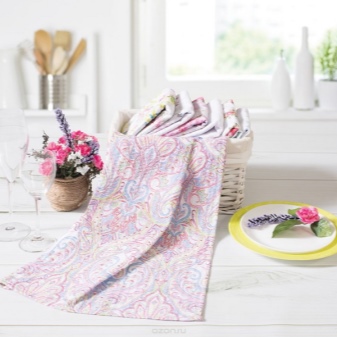
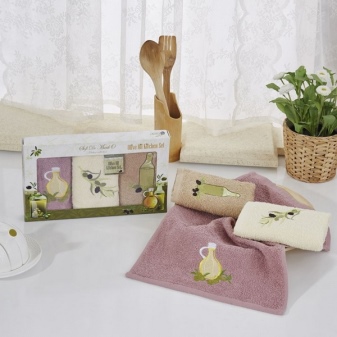
Cotton towels will serve for a long time, absorbing moisture efficiently and without harming human health. Linen products may turn out to be too rough to the touch, but some people, on the contrary, consider this a plus - a kind of massage occurs from contact with them. Flax absorbs liquid efficiently. Velor is not particularly recommended for the kitchen, as its absorbency is mediocre. Terry towels take a long time to dry, but they are pleasant to the touch. Recently, bamboo towels have become popular. They are excellent at collecting moisture, are not "impregnated" by extraneous odors, and are not exposed to mold or mildew.
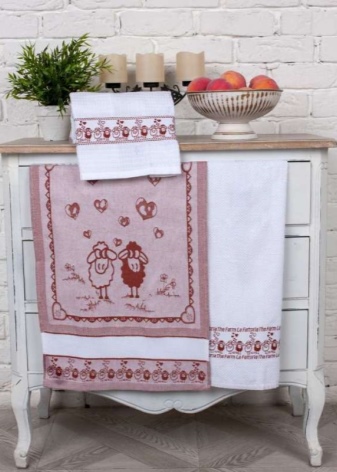
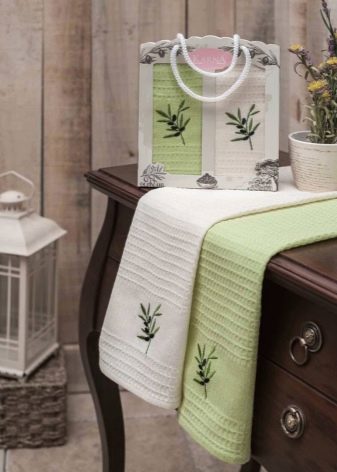
Forms
Kitchen napkins can be in any shape. Of course, rectangles are considered classic, but a round or oval towel looks very original. The main criterion in this matter is convenience, so if the hostess does not find it difficult to wipe objects with rounded fragments, then she may well make such an original choice.
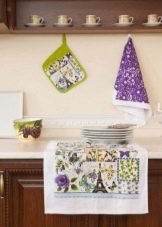
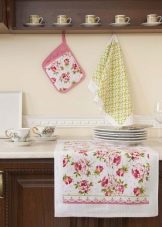
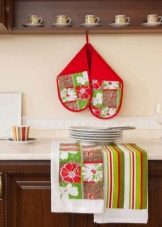
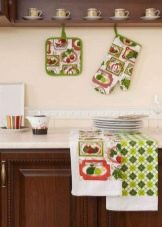
The size
Of course, kitchen towels can be of different sizes, but fabrics with a width of 40 centimeters and a length of 70 or 30 centimeters wide and 60 high are considered the most convenient. edges.
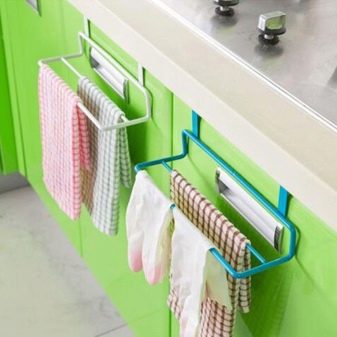
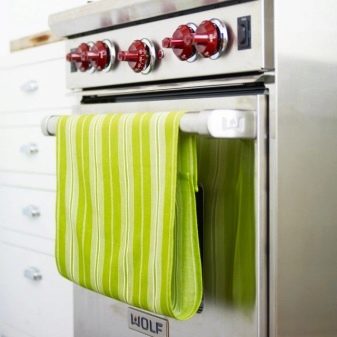
Colour
Plain towels with embroidery look best in the kitchen. In the event that the choice is made in favor of colorful textiles with numerous images, then they must necessarily "overlap" with the details of the interior.
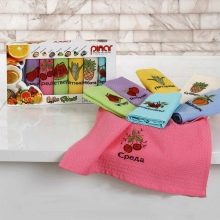
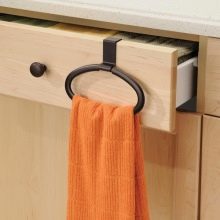
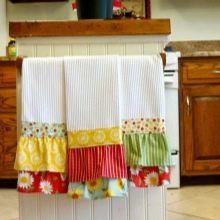
Design
Although beautiful towels are usually selected depending on the existing interior and color scheme, many housewives prefer to buy original napkins depending on the season. For example, in winter, festive New Year's decor dominates, in spring flowers "bloom" on towels, and in summer and autumn embroidery with the harvest and colorful leaves becomes relevant. It is important not to forget about the loops, which can be made of laces, ribbons, buttons and other materials. As a rule, almost every holiday a new textile gift set appears in the family, but if it does not match the kitchen design, you should not "force" yourself - it is better to give it to someone else.
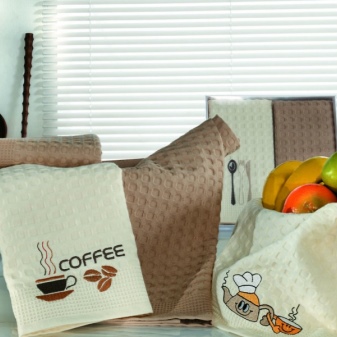
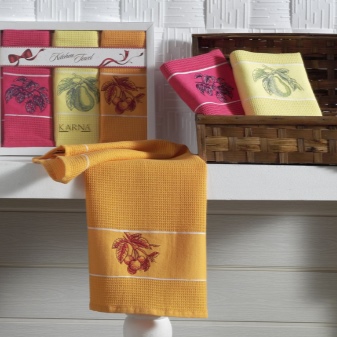
The use of paper counterparts
Disposable napkins come in handy in the kitchen on many occasions. For example, with their help it will turn out to get raw fish, poultry or meat wet before further processing, or, for example, soaking in a marinade. Towels are indispensable and when you need to remove excess fat. For example, this happens when cooking pancakes, pancakes, cheesecakes or cutlets. Finally, paper napkins come in handy for some dirty tasks: remove leftover food from the sink, blot drops on a plate before serving, pick up a piece of food that has fallen from the floor, or simply wipe your dirty hands. Storage of such towels is convenient if you have a special holder.
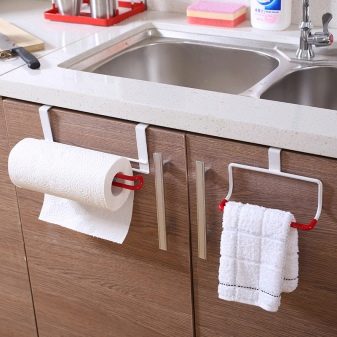
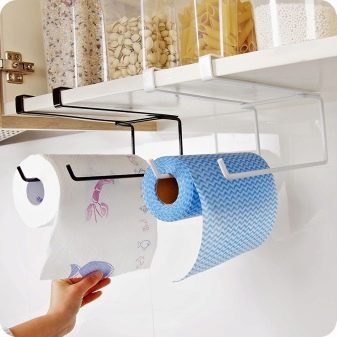
Popular manufacturers
A large number of firms produce kitchen textiles, and the brands can be both Russian and created in Turkey. Of the well-known manufacturers, Oriflame deserves attention, presenting the White Gold product line with unobtrusive sparkling prints and a rich base shade. Other famous brands of towels include Tac, Vasilisa, Mona Liza, Romance, Fidget, Lyubimy Dom, and others. By the way, any manufacturers should pay attention to Nedelka towels. They are a set of seven napkins for each day of the week. Taking advantage of the "Week", you will be able to accustom yourself to kitchen hygiene and regular change of towels.
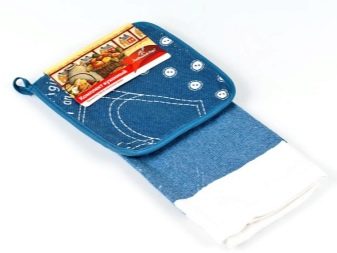
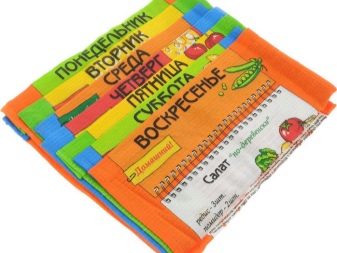
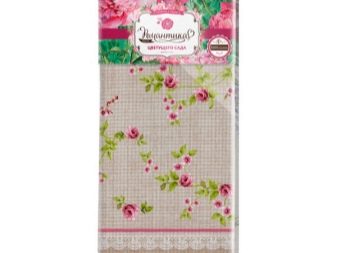

DIY sewing
Even a novice hostess can sew a towel with her own hands. This requires only fabric, scissors, a sewing machine, thread and a needle. By choosing a linen or waffle base, it will be possible to realize any fantasy ideas with the help of multi-colored threads. By the way, you don't have to buy new fabric. Fragments of old clothes, for example, a chintz dress, are quite suitable for this case.
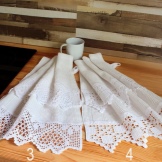
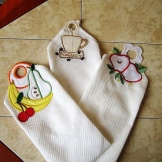
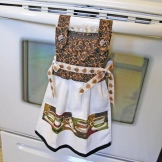
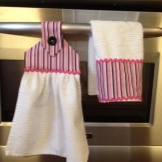
Sewing the simplest towel begins by cutting a rectangle from the fabric with a length of 62 centimeters and a width of 32 centimeters, where a couple of centimeters will go to the folds. In addition, about 5 millimeters of the edge can be smoothed with an iron to even out the edge. The folds are secured with pins, and the edges are sewn with a sewing machine. In addition, the edges are overcast with a zigzag.
Storage and use
It is most convenient to store clean towels near the sink so that you can wipe and dry your hands or the dishes immediately. If you use a separate towel for the plates, you will have to place them in different places. For example, special rails fixed on the cabinet doors, or somewhere close, are suitable for storage. You can also hang napkins on a variety of hooks.They can be conventional, nail-mounted, self-adhesive, or rings placed on cabinet handles.
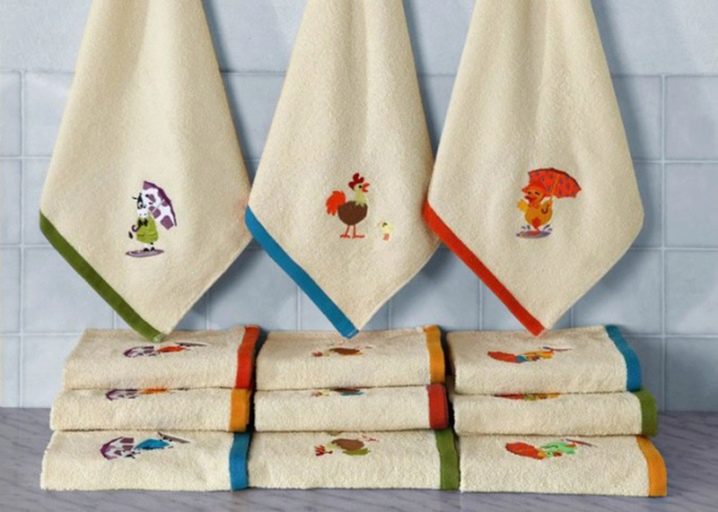
It is convenient to hang towels on the horizontal handle of the oven, however, as a rule, you will have to walk for a long time to the sink. There are also special holders for the kitchen. It is better to remove microfiber scraps and “casual” work napkins inside the cabinet.
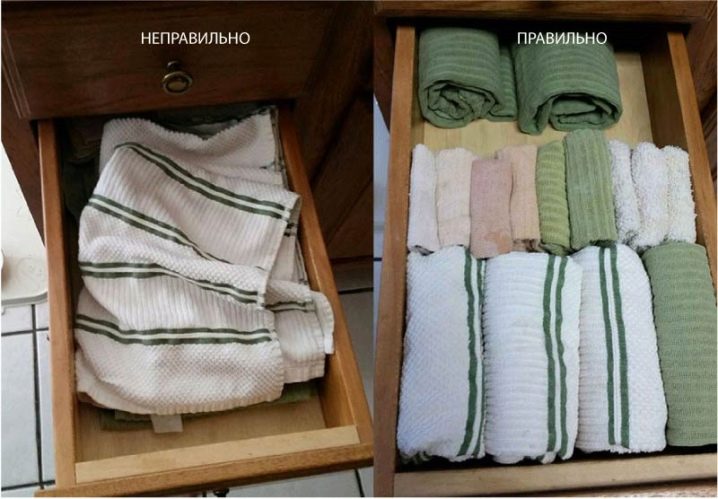
Care rules
It is worth starting with the fact that it is recommended to wash kitchen towels separately from other things and even towels from the bathroom. The fact is that, constantly absorbing liquid, the fabric accumulates a variety of microbes and bacteria, which cannot be dealt with by a delicate washing regime, suitable, for example, for sheets. In the most favorable situation, kitchen towels are changed every three days, although this figure depends on the frequency of use and the number of people using the kitchen. The need for change is determined depending on the aroma - the smell of dirty fabric appears earlier than an unpleasant appearance.
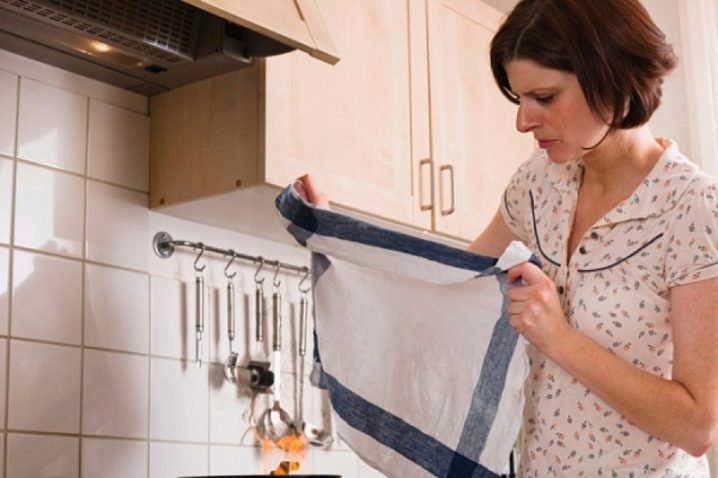
They are washed using ordinary powder at a temperature of 60 to 90 degrees, depending on the color of the fabric. Stubborn dirt can be pre-soaked in bleach or in a solution of soap and soda. Of the homemade recipes, soaking towels in 20 grams of salt dissolved in a liter of cold water is considered the most effective.
Oily stains from sunflower oil are treated with a regular dishwashing solution before washing. It is most convenient to do this in the evening, and in the morning to wash towels as usual. In addition, it is worth trying to treat the dirt with 72% soap and leave for four hours. In the event that it has been decided to soak the kitchen napkins in advance, you can add table vinegar to the water. The proportion will be as follows: twenty grams of the product for a couple of liters of water. In an extreme situation, it is allowed to use a water pipe cleaner diluted in water.
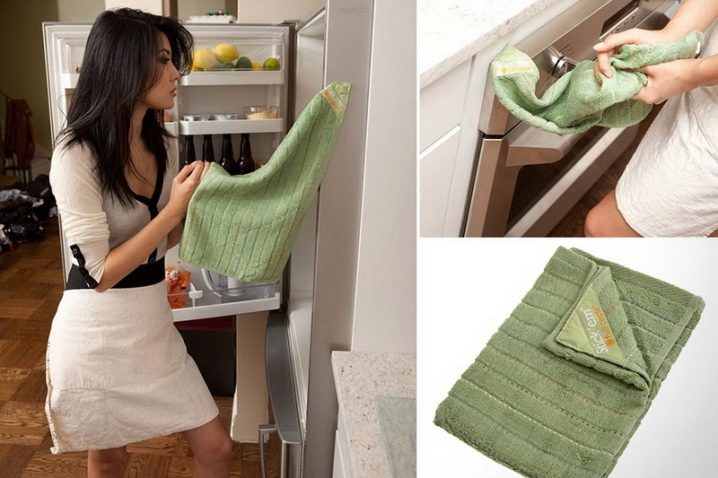
Thrifty housewives bleach towels with mustard gruel applied to the stained surface. Sometimes a solution of manganese, diluted in water intended for soaking, also helps. With its help, by the way, it will be possible to destroy the ingrained aroma of the food being prepared. Hydrogen peroxide added to water does a good job. In addition to disinfection, it also ensures successful mold control.
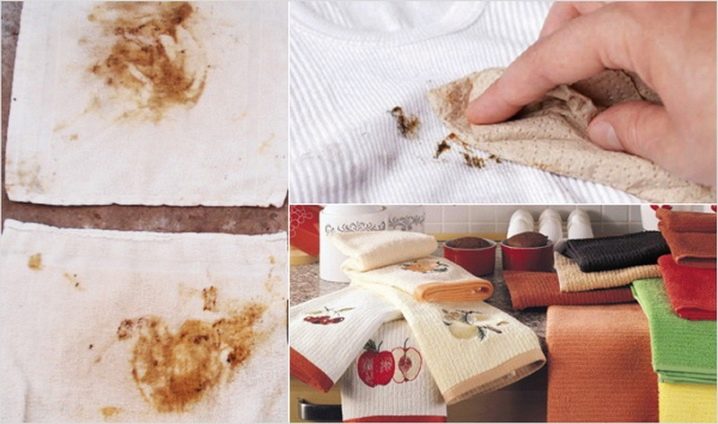
It is recommended to boil white kitchen napkins. Water is poured into a large saucepan. As soon as it starts to boil, you can add 40 grams of bleach, 40 grams of vegetable oil and 180 grams of washing powder to it. The liquid is thoroughly mixed and towels are placed in it. After boiling the contents for about ten minutes, you can turn off the heat, leaving the lid closed. This technique is extremely effective, but unfortunately it is not suitable for synthetic towels.
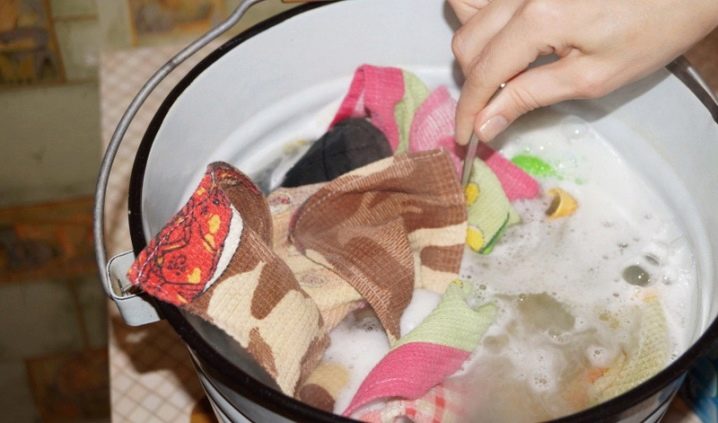
For how to wash kitchen towels with your own hands, see the next video.













The comment was sent successfully.